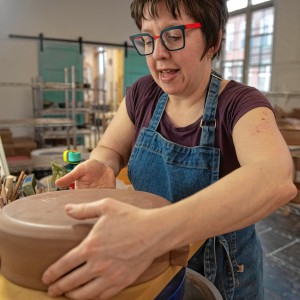The Mentalist: Amherst College philosophy professor Alexander George moonlights as a mind reader
| Published: 05-24-2018 11:44 AM |
By day, he’s in the classroom, leading discussions on ethics, value, knowledge and other philosophical questions, as well as the ideas of specific philosophers themselves.
By night, he leads a different kind of discussion — a performance, really — that involves reading people’s minds through careful observation of their body language, tone of voice or other physical cues.
But for Alexander George, a longtime professor of philosophy at Amherst College, there’s a clear connection between interacting with a room full of college students and performing as a mentalist with a small audience.
“I think I’ve learned more about how to put together a mentalism show from being a professor than anywhere,” George said in a recent interview. “There’s a kind of performative element and interactive element to my day job that is intimately connected to mentalism.”
That’s partly why George, who’s been teaching at Amherst since 1988, has begun moonlighting, performing as “Alex” in “Mind Reading After Hours.” It’s the title of his act, in which he’s wowed small audiences at the Iconica Social Club in downtown Northampton with an array of card tricks and other demonstrations of his ability to decipher secrets.
To be clear, he defines what he does as mentalism, which broadly speaking means a performing art in which practitioners — sometimes called “psychic entertainers” — are able to demonstrate mysterious intuitive abilities that can include clairvoyance, telepathy and impressive feats of memory.
George’s card tricks, for instance, don’t rely on sleight of hand. At his debut show at the Iconica Social Club, in early May, he consistently — with one exception — was able to determine or predict a number of outcomes: what card a person had secretly selected from a deck; the numerical value of a sequence of cards another person had in his or her hand; and the number of red and black cards in two different piles.
His interactive show, in which all his exercises are conducted with at least one participant at a time, is based “90 percent on body reading and the rest on following a hunch,” he told the dozen people in the room. “We don’t realize how much we give away through body language.’
Article continues after...
Yesterday's Most Read Articles
To back up that statement, he quoted Sigmund Freud, who famously said that “no mortal can keep a secret. If his lips are silent, he chatters with his fingertips; betrayal oozes out of him at every pore.”
But George didn’t get overly serious: His show was leavened with plenty of dry humor. Dressed in a light sports jacket and a white button shirt, he introduced a version of the shell game, in which, with his back turned, he had audience members hide a crumpled piece of paper beneath one of three cups on a table and move the cups around.
Then he asked them different questions to gauge the tones of their voices and used that to discover — correctly in all cases — under which cup the paper was hidden.
“You seem like a very nice person,” he said to Nancy Pulley of Easthampton as he plucked the cup off of the paper she’d hidden. “But you’re not a good liar.”
“I know!” Pulley said with a laugh. “I’ve never been able to lie.”
George, who grew up in New York City, says he was fascinated with magic as a boy and recalls performing tricks for his parents; he also liked watching hustlers leading Three-card Monte games, a variation of the shell game, on the city’s sidewalks.
By the time he was in his teens, he says he’d “moved on to other things.” But a few years ago, he was doing some reading on local history and discovered that Lake Pleasant, one of the villages within the Town of Montague, was “the epicenter of spiritualism in the U.S.” in the late 19th century. There was a railroad station right on the lake, he notes, that brought vacationers as well as magicians, mediums and people interested in the occult to the area in summer.
“After reading about that, I started getting the bug again,” he said, noting that he’s also read widely about spiritualism and related topics, such as biographies of magicians and the history of magic.
But George likes to point to the difference he sees between magic tricks and the practice of mentalism, suggesting the former relies on a certain suspension of an audience’s belief as well as a magician’s technical skills, while mentalism is less predictable.
“People enjoy magic — it’s a wonderful art form, but they know doves don’t appear out of thin air and that objects don’t disappear and reconstitute somewhere else,” he said. “But when it comes to the mind, I think it’s a very different game.
“In a mentalist performance, the audience can have an experience that they can’t have in a straight magic show,” George added. “Instead they can really be wondering what they’ve seen. It puts them into a position of uncertainty.”
That’s not to say George doesn’t bring practical skills to the table. He’s an experienced poker player and, he told his audience at the Iconica Social Club in early May, knows how to identify the “tell” of many other players when they bluff. He also knows how to count cards — the kind of trick, he said, “that will get you thrown out of a casino.”
But unlike a lot of magic tricks that you can work on at home, he added, “In mentalism or mind reading, you can’t just practice in front of a mirror. It’s so interactive, and it’s exciting to be on your feet and attuned to what the audience is doing.”
And he says his years in the classroom, where he needs to be able to read his students’ expressions and tone of voice to gauge their mood and level of engagement, has also been key to his preparation as a mind reader.
George spent part of the last two years working on his act for free, giving performances in a number of senior centers in the area. With the help of his wife, Elisa Mai — she works with VentureWell, a Hadley nonprofit organization that helps faculty and students start socially beneficial businesses — he scheduled a string of professional performances for Iconica for May and June (tickets are $15).
At his show in early May, he had three audience members secretly look at a card, then used three different methods, such as looking at one man’s face and listening to a woman’s voice, to identify the card. He had Christine Kern Warnock of Easthampton touch his hand with a finger as he asked about her card — and some subtle variation in her touch led him to name her card, correctly.
As a prelude to another exercise — trying to sort unseen cards by their color — he told audience members that people often can do better on these sorts of psychic tests by trusting their intuition, rather than overthinking the issue. To demonstrate, he asked an audience member to volunteer the number of a friend or family member who he could call on his cell phone and have that person take part in the demonstration, without being able to see it or understand what it was about.
Susan Heitker of Amherst volunteered her brother, Bob, in Ohio, and George called him, putting his phone on speaker. Bob picked up, and George introduced himself, explaining that he had Susan with him, “but she’s not in any danger. I’m not about to ask for any ransom.”
As laughter rang around the room, Bob could be heard saying, “Well, you wouldn’t get much, in any case.”
After another round of laughter, George, holding a number of cards, facedown, asked Bob to respond to a series of simple questions: Red or black? He was asking Bob to direct him to place the unseen cards in his hand, one by one, on either of two piles of face-up cards on the table, one red, one black.
Following Bob’s prompts, George placed all his cards, then flipped them face up — and all the reds were in one pile, all the blacks in the other. As everyone applauded, George thanked Bob and offered a tip from his favorite philosopher, the Austrian-British Ludwig Wittgenstein, about trusting one’s intuition or playing a hunch: “Don’t think, just look.”
Footnote: A few days after his performance, I received a short letter from George thanking me for coming to the show. Included in the letter was a small, sealed brown envelope, about the size of a business card, that George asked me not to open until he came by the Gazette later that week for an interview. “I had a hunch about something this morning,” he wrote.
At the end of our interview a few days later, he did another exercise, in which he wrote the numbers one to five on a small card, then had me try to guess whether he had a dime or a penny in his left hand; I was to put a check next to the appropriate number if I guessed right, an “x” if I guessed wrong. I guessed correctly two out of five times and marked the card accordingly, in the order of my attempts.
Then I opened the tiny envelope he’d mailed me. Inside was a small card that was an exact duplicate of the one already in front of me, with the numbers one to five and a check or “x” next to the same numbers I’d just marked on the first card.
Touché, sir.
Steve Pfarrer can be reached at spfarrer@gazettenet.com.
For more information on Alexander George’s performances, or to buy tickets (shows run through June), visit hereadsminds.com.

 Speaking of Nature: ‘Those sound like chickens’: Wood frogs and spring peepers are back — and loud as ever
Speaking of Nature: ‘Those sound like chickens’: Wood frogs and spring peepers are back — and loud as ever Hitting the ceramic circuit: Asparagus Valley Pottery Trail turns 20 years old, April 27-28
Hitting the ceramic circuit: Asparagus Valley Pottery Trail turns 20 years old, April 27-28 Best Bites: A familiar feast: The Passover Seder traditions and tastes my family holds dear
Best Bites: A familiar feast: The Passover Seder traditions and tastes my family holds dear Valley Bounty: Your soil will thank you: As garden season gets underway, Whately farm provides ‘black gold’ to many
Valley Bounty: Your soil will thank you: As garden season gets underway, Whately farm provides ‘black gold’ to many
